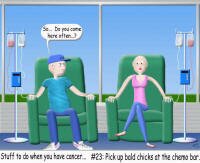"Chemotherapy is a cancer treatment that uses drugs to destroy cancer cells. It is also called “chemo.” Today, there are many different kinds of chemotherapy. So the way you feel during treatment may be very different from someone else."
~ NCI Understanding Chemotherapy
 I spend a lot of time explaining the bad but also the good aspects of "chemotherapy" to the lymphoma patient community - as best I can, as a student of the science.
I spend a lot of time explaining the bad but also the good aspects of "chemotherapy" to the lymphoma patient community - as best I can, as a student of the science.
Chemotherapy has a bad public image ... perhaps in part due to the less than satisfactory outcomes for many types of metastatic solid cancers.
Here my goal is to touch on and provide a basic appreciation for the role of chemotherapy agents in lymphoma and other blood cell cancers, how these agents work, and the role of chemotherapy as a component of immune therapy.
Blood cell cancers are highly sensitive to the effects of chemotherapy agents. Hodgkin's lymphoma, for example, was among the first cancer cured by chemo - and the cure rate for advanced HL is about 70%- 90% today - thanks to chemo. (A point made that got me kicked off an alternative medicine site – a long while ago : ).
Chemo agents (the cytotoxic kinds) do indeed suppress the immune system - quickly and substantially. This is a reason it's highly effective against blood cell cancers -- the reason it has been and remains a vital class of drugs for lymphoma and leukemia.
The rate and degree of immune recovery from cytotoxic chemo depends on the dose, schedule, and the type of chemo. Most chemo agents do not significantly impair hematopoietic stem cells, allowing the new blood cells to emerge -- often leading to a full recovery of the immune system.
It's not widely appreciated that chemo can also modify the immune profile and its behavior in useful ways. High dose Cytoxan, for example, induces the bone marrow to release stem cells into the peripheral blood (for harvesting prior to stem cell rescue protocols) and is being studied as a way to reset the immune system as a treatment for autoimmune disease. Low dose Cytoxan is thought to be immune modulating ... modifying the immune profile in ways that supports the immune response against cancer (perhaps by its effect on regulatory t-cells).
... How chemo works directly (the most common mechanism of action) is to cause damage to rapidly dividing cells - which can trigger the cell death pathway - a built-in cellular defense against cancer. So chemo is a kind of targeted drug, but one with modest specificity for dividing tumor cells.
... Chemo can lead to an immune response when tumor cells (lysed by chemo) are engulfed by immune cells that present the abnormal tumor proteins to other immune cells. A chemo-induced vaccine effect can potentially lead to an immune response against residual tumor cells as the immune system recovers. This indirect effect is also seen with radiotherapy - where tumors in distant sites can regress following localized radiation - presumably due to a treatment-induced vaccine effect. For lymphoma, certain immune profiles (Staudt, NCI) were associated with curative responses to chemo.
Two of the gene-expression signatures that were associated with a good outcome suggest that the immune response to the tumor cells may be a crucial determinant of survival after chemotherapy. The MHC class II gene-expression signature correlated with a good outcome, suggesting that antigen presentation to the immune system has a role in therapeutic responses.
JNCI: Gene Profiles May Help Predict Response to Chemotherapy http://bit.ly/1MTDCz4
Rituxan is a different and important new class of drug ... a biologic immunotherapy. It's a man-made antibody (a biologic) that binds to a receptor on the surface of lymphoma cells, which has direct effects but also flags the cells for an immune response. The combination of chemo with Rituxan (chemo-immunotherapy) has improved survival for lymphoma patients significantly in recent years.
While no patient relishes the idea of receiving cytotoxic chemotherapy treatment, it's vital to appreciate the proven benefits of this class of drug in lymphoma ... so that we can make informed choices -- guided by our trained physicians.
It seems evident that the value and potential of chemo drugs differs a lot by type of cancer, type of chemo, the dose, and when you give it. It's value as a component of immunotherapy is not widely appreciated but is well established in the literature. The value of chemotherapy as an effective part of therapy specific to lymphoma should not be forgotten.
Karl Schwartz, patient advocate